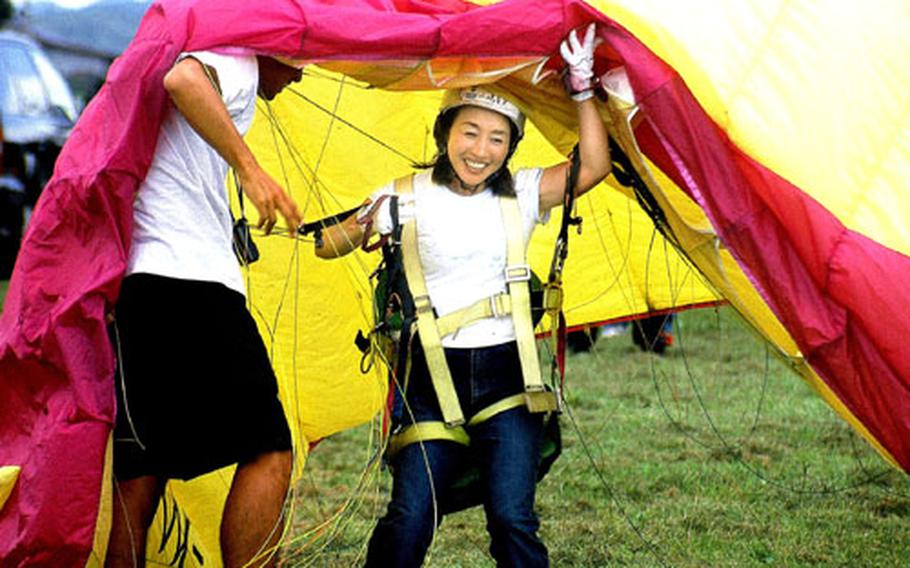
Grand Vollee paraglider instructor Shin Kobayashi, left, helps untangle Yokota Air Base dental clinic assistant Keiko Matsuzawa from her parasail during Sept. 6 flight training near Tsukiyonomachi. (Roger Harnack / S&S)
Barb Stewart and her daughter Morgan, 6, love the opportunities for hiking and rock climbing Japan offers. But without English maps and signs, Stewart found trips into the unknown to be a little tricky.
So the two signed up for a handful of tours with Outdoor Recreation at Fleet Activities Yokosuka, where Stewart’s husband, Lt. Joel Stewart, is based. When he’s in port, all three take trips.
Most recently, Barb and her daughter went rock climbing, a major goal for little Morgan. “She’s always wanted to do it,” Stewart said.
With the transportation arranged and a guide for safety, the Stewarts could take the trip easily.
“I wouldn’t go alone,” Stewart said. “It was too difficult to find places and understand maps.”
Outdoor recreation departments at Pacific installations help servicemembers and their families break away from the confines of a base to see the country they live in and enjoy the great outdoors. Many lend mountain bikes and camping gear and can help arrange off-base trips.
“We get military members off the base, out of the gates and interacting with the Japanese community,” said Joe Heinrichs, outdoor recreation director at Yokota Air Base, Japan.
Outdoor recreation generally refers to human-powered sports like walking, biking and paddling. It offers exercise, keeps skills sharpened and gives young servicemembers an alternative to bars.
Rec programs can also introduce people to outdoor sports, particularly if they’re from an urban area where even hiking is foreign.
If they enjoy it, they can continue on another tour or on their own.
In Japan, Okinawa and South Korea, servicemembers have rocks to climb and mountains to hike, along with skiing and, in some areas, white-water rafting, sea kayaking and paragliding.
“People here are dying to go hiking,” Heinrichs said. “People are really in tune to the outdoors.”
The popularity of outdoor sports, especially extreme sports, is growing in the States, and base recreation departments are catching the bug.
“The whole industry is just exploding,” said Heinrichs, who came to the base several months ago.
When he arrived, Heinrichs found a real need for adventure among people living in billeting.
“I found people are bored stiff,” he said.
So he created a program called Stranger Sports to offer unique options for exercise, competition and fun.
There’s mountain bike polo, underwater hockey and soccer tennis.
“We want to get folks out there that are into the same routine,” he said.
Many outdoor recreation trips and programs are created by requests from the base community and ideas gleaned from trends in the United States.
Safety is paramount to any new trip, said Ken Morgan, Yokosuka’s outdoor equipment rental and retail manager.
At Yokosuka, all the guides are certified wilderness first responders, a type of first aid qualification, and are bilingual.
Yokosuka also benefits from experienced local hikers such as Tetsuya Ishida, who manages the outdoor adventure program and has been hiking the nearby mountains for years.
Before a trip is offered, staff members assess the risks and look for safety backups, such as the nearest hospital. They take the trip themselves with an eye to obstacles and safety concerns.
Trips are also planned based on availability and cost. Hiking is cheapest. White-water rafting involves a vendor, or tour company, so it’s more expensive, although MWR departments subsidize trips at many bases.
Morgan said the tours try to interest the largest number of people, not just the extreme sports fans, so they offer a balance of easy and difficult options.
Tens of thousands of people sign up for the tours each year, Morgan said.
Other bases look to their customers — servicemembers — for ideas.
“We pretty much go by customer demand. But a lot of it goes by what’s available here,” said Ronald Stark, the previous acting director of Outdoor Recreation for Air Force Services at Misawa Air Base, Japan.
There is no white-water rafting in the area near Misawa, but plenty of hiking, camping and winter skiing and snowboarding. Organizers in Misawa work with local ski resorts and tour providers to plan trips.
Servicemembers on Okinawa have many opportunities to scuba dive through MCCS Tsunami Gear centers on most Marine bases. Several bases have marinas where boats and other equipment can be rented. Servicemembers and Department of Defense employees and their families can also learn to fly at Kadena Air Base.
At Fleet Activities Sasebo, in addition to liberty trips, sailors can rent equipment and learn to sail or go hiking through the Sailing and Outdoor Adventure Center.
At Marine Corps Air Station Iwakuni, Marines can borrow gear for camping and winter sports, play at the paintball range or join a program with Semper Fit Outdoor Recreation. Or, rent boats from the MCCS Marina.
South Korea has rock climbing, rappelling and hiking.
“Wherever you are in Korea, you’re always close to mountains, for the most part,” said Gary Frankovich, director of marketing for MWR and Installation Management Agency Korea.
Trips in Korea are organized by the USO or through MWR programs like BOSS — Better Opportunities for Single (and unaccompanied) Soldiers, Frankovich said.
Recreation Centers on various installations can recommend nearby hikes and rent gear. Servicemembers and Department of Defense employees in South Korea can also visit the recreation area at Cheju Island, an hour flight from Seoul. The area has horseback riding, mountain bikes and water sports.
There aren’t as many opportunities in South Korea for camping and boating as places like Okinawa, so rec departments must be creative to get soldiers off post, Frankovich said.
“We really don’t have those things in this area [campgrounds and marinas],” he said. “So it’s a little more challenging here.”